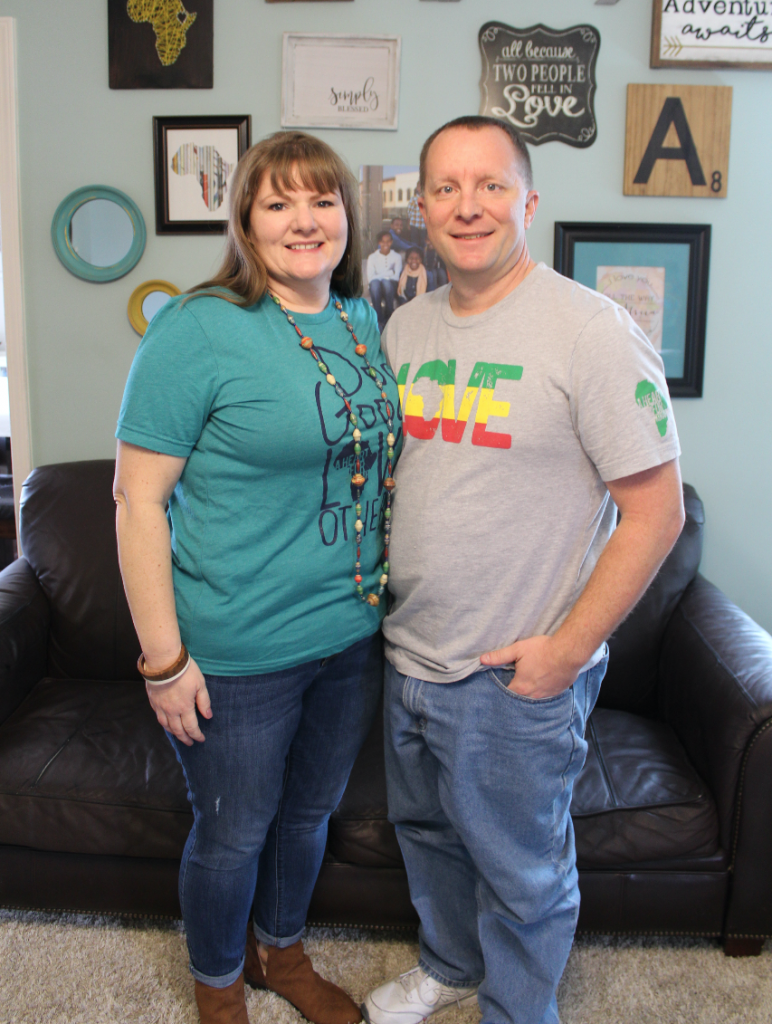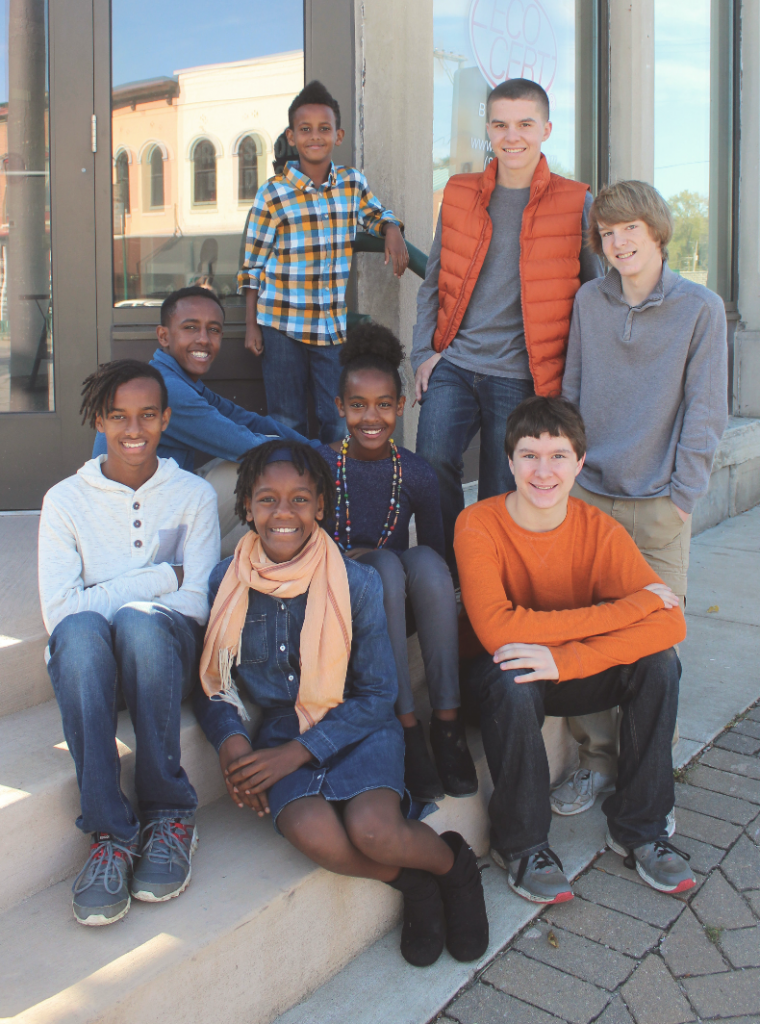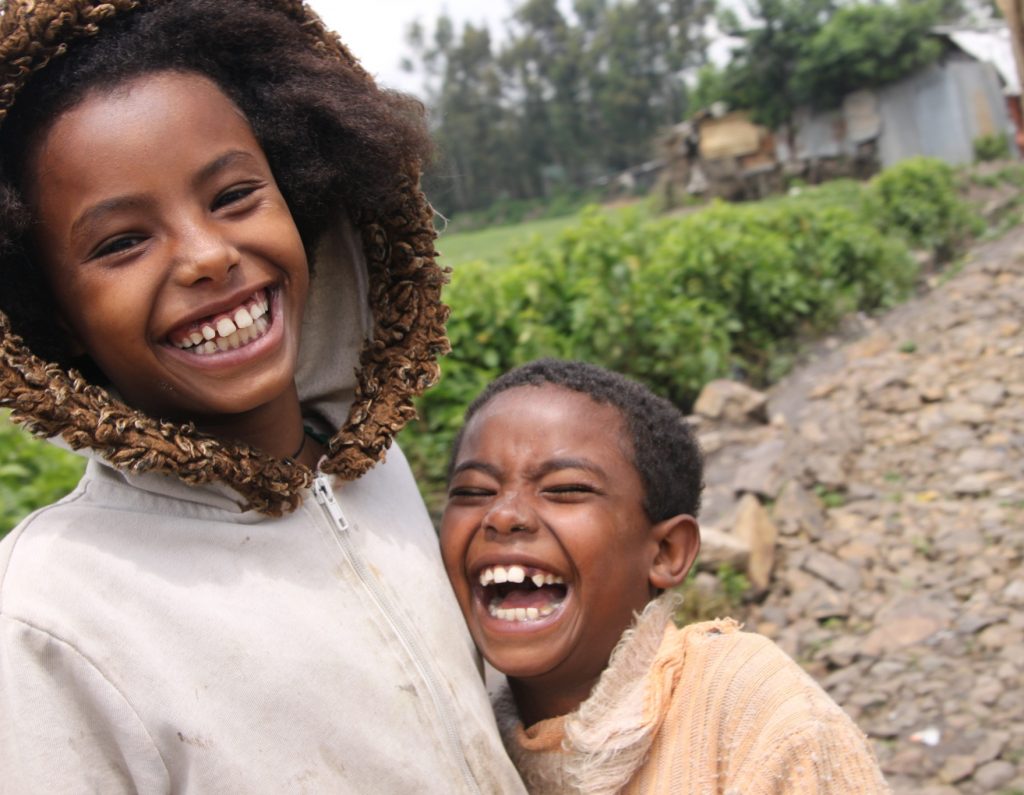Family Creates Outreach Program to Provide Support to Ethiopians Living in Poverty
Writer: Christy Heitger-Ewing
Photographer: Lawana Penrod
 Though they were a happy family of five, Tisha and Monte Alexander knew deep in their hearts that they wanted to expand their family through adoption. They had three biological sons and in 2006 began looking into various adoption options. After initially considering China, they learned that in Ethiopia they could adopt siblings. After starting the paperwork to adopt in Ethiopia, in 2009 they flew to Africa to pick up their 2 and a half-year-old twin girls.
Though they were a happy family of five, Tisha and Monte Alexander knew deep in their hearts that they wanted to expand their family through adoption. They had three biological sons and in 2006 began looking into various adoption options. After initially considering China, they learned that in Ethiopia they could adopt siblings. After starting the paperwork to adopt in Ethiopia, in 2009 they flew to Africa to pick up their 2 and a half-year-old twin girls.
“It’s kind of crazy. When you walk into the orphanage, they literally hand you your kids and are like, ‘Have a nice day!’” says Tisha, noting what a shock to the system it was for all involved. Nevertheless, Tisha and her husband welcomed their daughters Hannah and Chloe with open arms and were excited to introduce them to their sons Isaac, John and Josiah.
The couple thought their family was complete, but then the earthquake hit Haiti in January 2010 and their plans changed. Tisha and Monte felt they had space in their hearts for more children. So in 2011, they started the process once again.
“It hasn’t been easy. I’m never going to tell anyone that adopting a child is easy,” says Tisha, though she admits that she went into the second adoption with her mind set to only adopt one more. They knew, however, how hard it is for sibling groups to be placed. One night Monte, a mortgage underwriting manager, told his wife, “I think we should be open to adopting three siblings.”
Tisha’s jaw hit the floor, but it didn’t stay there for long. About this time, a friend of the Alexanders posted to social media a plea to help three Ethiopian brothers who were waiting to be adopted. They were older children—ages five, six and seven at the time, but Tisha and Monte felt a visceral pull to move forward.
In May 2012, the Alexanders singed to adopt David, Jude and Simeon. When Tisha flew to Africa to pick them up in December 2012, she took her mother Sheila with her. When the women stepped off the plane, the man who picked them up asked if he could take them to tour Korah, a community of 130,000 people who live on the outskirts of the city dump.
“I can honestly say that my life changed the moment I stepped into Korah,” says Tisha, whose nose immediately crinkled at the rancid smell of rotten, decomposing food and the stench of overwhelming sickness. In Korah, villagers forage for scraps from the trash trucks. Their homes are made out of plastic tarps, secured only by wooden sticks. Most every person living there is plagued by modern-day leprosy, HIV and AIDS, polio or tuberculosis. Since they all live in such close proximity, illness spreads rapidly and cannot be eradicated.
“Korah means ‘cursed’ in their language,” Tisha says. It seems appropriate as these people have no government assistance, no modern medicine and no place to go.
“The hopelessness is overwhelming,” Tisha says. “But even so, they wanted to serve us coffee. They wanted to share with us what little they had.”
Her time in Korah completely transformed her heart, and when Tisha first returned home to the United States, she talked to her husband about sponsoring a family (doing so involves providing a family with 80 pounds of dry stock food each month, including wheat, macaroni, rice, cooking oil and bananas).
“I thought we would sponsor a family or two and that would be it,” Tisha says. “Turns out, the Lord had a different plan.”
Ultimately, Tisha created A Heart for Korah, a non-profit 501c3 whose mission is to demonstrate the love of Jesus Christ to the people of Ethiopia —primarily Korah — through outreach programs designed to support families, economic means, Christian education and community development.
The adoption process has been painful at times for all involved.
“You see photos of these kids and you fall in love with them,” Tisha says. “But then you get them home and they’re yelling at you, spitting in your face and being very defiant. [That behavior] makes it really hard to bond.”
You have to remember that adoption is trauma. Taking a child away from its biological family, whether it’s from foster care or traveling from a third-world country, is traumatic. As a result, every adopted child has some sort of attachment disorders.
“It’s not easy taking in kids with raw trauma,” Tisha says. “Their hearts are healing. You don’t speak their language. You’re bringing them into a first-world country. I can’t begin to imagine how overwhelming that is for them.”
 The second adoption journey was easier on the family as Tisha knew what to expect. They also saw an adoption counselor to assist with the transition.
The second adoption journey was easier on the family as Tisha knew what to expect. They also saw an adoption counselor to assist with the transition.
“It helps having multiple people invested in your kids,” says Tisha, who homeschools the children simply because it’s the most practical option.
“Three of my Ethiopian-born children excel at soccer. My oldest just went for national training. If we didn’t homeschool, I would never see my kids,” says Tisha, who has been a stay-at-home mom for the past 16 years. Prior to that, she worked for the National Institute for Fitness & Sport.
Her biggest piece of advice when it comes to bonding after bringing a child home is to try and make the world as small as possible.
“Resist the urge to do all the extra stuff initially — big family trips and things like that,” Tisha says. “Instead, establish routines at home.”
Tisha and Monte, who have recently become foster parents to a 4-year-old boy and a 9-month-old baby, find overwhelming satisfaction working with the people of Korah.
“It’s funny. You think you’re giving your time and resources by helping another family, but what you aren’t prepared for is what you receive in return,” says Tisha, noting that unlike America, where you have to make an appointment to visit a friend, in Ethiopia, you walk into people’s homes and they are eager to spend the afternoon with you.
“They’re so joyful and so giving,” Tisha adds. “They want to be with you.”
The Alexanders occasionally travel back to Africa so that the children can visit with their birth families, but since a single plane ticket costs roughly $2,000, each child raises money to help fund the trip. Last year, for instance, the girls sold 450 dozen cookies, delivering 50 dozen cookies on Christmas Eve to various families around town.
“They had money left over after purchasing their tickets, so they gave it to their birth families to help them start a business,” Tisha says.
The phrase Tisha most often hears from friends is, “I don’t know how you do it,” but she insists that her life, her children and her mission work are a privilege.
“The people of Korah deserve to know that people on the other side of the world care about them,” Tisha says. “My greatest wish is for them to really see their worth.”
For more information or to sponsor a family in Korah, visit aheartforkorah.com.





